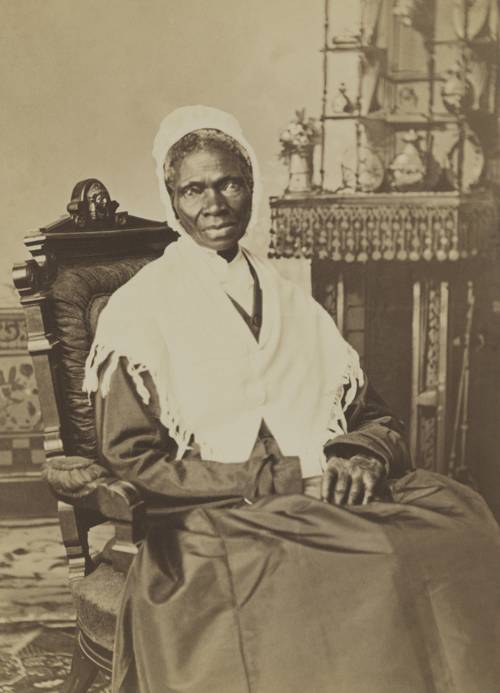
FAQ About Sojourner Truth

Who was Sojourner Truth?
Sojourner Truth, born as Isabella Baumfree, was an African-American abolitionist and women's rights activist. She was born into slavery in Swartekill, New York, in 1797. After gaining her freedom in 1826, she became an influential speaker, known for her powerful speeches against slavery and in support of women's rights.

What is Sojourner Truth best known for?
Sojourner Truth is best known for her work as an abolitionist and a women's rights activist. She delivered a famous speech titled "Ain't I a Woman?" at the Ohio Women's Rights Convention in 1851, which highlighted the intersection of race and gender discrimination.

What was the significance of the "Ain't I a Woman?" speech?
The "Ain't I a Woman?" speech, delivered by Sojourner Truth in 1851, is significant for its powerful critique of gender and racial inequalities. It challenged the prevailing notions of racial and gender inferiority and called for equal rights for all women, regardless of race.

Where was Sojourner Truth born?
Sojourner Truth was born in Swartekill, New York, in 1797. She was born into slavery and given the name Isabella Baumfree, but later changed her name to reflect her mission in life after gaining her freedom.

How did Sojourner Truth gain her freedom?
Sojourner Truth gained her freedom in 1826 when New York State began to abolish slavery. She walked away with her infant daughter, leaving behind other children who were later freed. In 1828, she successfully sued for the return of her son, making her one of the first black women to win a case against a white man in a U.S. court.

Why did Sojourner Truth change her name?
Sojourner Truth changed her name from Isabella Baumfree in 1843. The new name was inspired by her religious faith and reflected her mission to travel and speak out for abolition and women's rights. "Sojourner" means "one who stays temporarily in a place," and "Truth" indicates her dedication to spreading her religious and social message.

Did Sojourner Truth ever learn to read or write?
Although Sojourner Truth never learned to read or write, she remained a powerful orator and a skilled communicator. She dictated her autobiography, "The Narrative of Sojourner Truth: A Northern Slave," to her friend, Olive Gilbert, which was published in 1850.

What impact did Sojourner Truth have on the abolitionist and women's rights movements?
Sojourner Truth had a profound impact on both the abolitionist and women's rights movements. Through her speeches and activism, she raised awareness of the double discrimination faced by African-American women and fought tirelessly for both racial and gender equality.

What legal battles did Sojourner Truth face?
In 1828, Sojourner Truth faced a significant legal battle when she sued for the return of her son, Peter, who had been illegally sold into slavery in Alabama. She won the case, becoming one of the first African-American women to successfully challenge a white man in a U.S. court.

How did Sojourner Truth contribute to the Civil War effort?
During the Civil War, Sojourner Truth worked to recruit African-American troops for the Union Army and organized supplies for black regiments. She also advocated for improving the conditions of freed slaves and met with President Abraham Lincoln in 1864 to discuss her concerns and support the war effort.

What was Sojourner Truth's relationship with other abolitionists?
Sojourner Truth collaborated with many prominent abolitionists, including Frederick Douglass, William Lloyd Garrison, and Harriet Beecher Stowe. Her relationships with other activists were integral to her influence and ability to speak publicly against slavery and for women's rights.

When did Sojourner Truth pass away?
Sojourner Truth passed away on November 26, 1883, in Battle Creek, Michigan. Her legacy continues to be celebrated today for her contributions to social justice and equality.

What was the content of Sojourner Truth's autobiography?
The autobiography of Sojourner Truth, titled "The Narrative of Sojourner Truth: A Northern Slave," details her experiences from being born into slavery to her life as a free woman and abolitionist. It covers her early life, the injustice she faced, and her journey as a preacher and activist.

How did Sojourner Truth address gender equality in her activism?
Sojourner Truth addressed gender equality by emphasizing the intersectionality of race and gender. Her speeches, particularly "Ain't I a Woman?," highlighted the unique struggles faced by black women and argued for equal rights for all women, challenging societal norms that subordinated them.

Was Sojourner Truth associated with any political movements?
Sojourner Truth was deeply involved with both the abolitionist and women's rights movements. While she did not formally join any political party, her activism was politically charged, pushing for legislative changes to end slavery and promote women's suffrage.

How did Sojourner Truth influence future generations?
Sojourner Truth's speeches and activism have inspired generations of civil rights and women's rights advocates. Her courage, eloquence, and dedication to justice laid the groundwork for future movements striving for racial and gender equality.

What challenges did Sojourner Truth face as an African-American activist?
Sojourner Truth faced numerous challenges as an African-American activist, including racial discrimination, gender biases, and the threat of violence. Despite these obstacles, she continued to speak publicly and fight tirelessly for equal rights and justice.

What were some key events in Sojourner Truth's life?
Key events in Sojourner Truth's life include her escape from slavery in 1826, her successful legal battle for her son's freedom in 1828, her adoption of the name Sojourner Truth in 1843, and her "Ain't I a Woman?" speech in 1851. Each event marked significant milestones in her journey as a freedom fighter.

How is Sojourner Truth remembered today?
Sojourner Truth is remembered today as a pioneering figure in both the abolitionist and women's rights movements. Her life and legacy are celebrated through various honors, including historical markers, literature, and educational programs that recognize her contributions to social justice.

What personal experiences influenced Sojourner Truth's activism?
Sojourner Truth's personal experiences with slavery, racial and gender discrimination, and her deep religious faith greatly influenced her activism. These experiences gave her a unique perspective and fueled her commitment to fighting for the freedom and rights of others.
